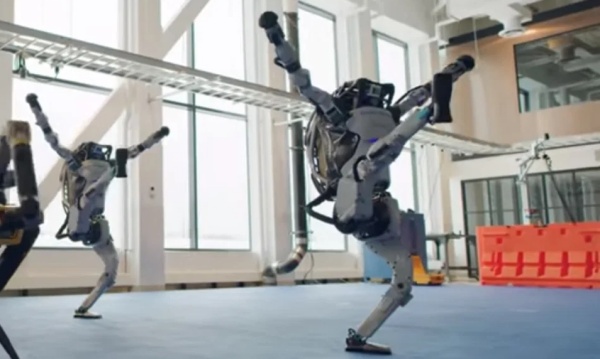From robots to dance, sex and back
Maybe the best thing I’ve read about robots in 2020.

Just what IS dance, again?
</em></u>
In mid-December 2020, Boston Dynamics (the same company that makes these “dogs”) published a video of two new anthropomorfic robots dancing to the tunes of “Do You Love Me?” One of the best effects of that video was to prompt James J. Ward to write maybe the best thing I have read about robots in 2020, something that really everybody should think about. As homage to that piece, but above all to push everybody to read it all, and spark more discussion, here are its most important paragraphs.
Robots don’t dance
Robots don’t dance. Robots are artifacts (Free Dictionary): "objects produced or shaped by human craft".
More specifically, robots are tools, that like any other tool since the stone axe exist just to move in the ways designed, or allowed for them, by humans.
If what they do appears like dancing, it is only because humans have an instinct to trick themselves, by always trying to find familiarity around them.
Dancing is done to express and share feelings, and community. Dancing is something humans do, because of the deep social, cultural, historical, or religious context it has for them.
That’s why robots don’t dance. They just can’t.
Why do people design humanoid robots anyway?
To exploit them, says Ward: “being realists, it’s because we want something that looks like a human to boss around. [To see that], go look up how humanoid robots are primarily used right now:"

We can DANCE, too!
</em></u>
The moment we get high-functioning, human-like robots, we sexualize them or force them to move in ways that we think are entertaining, or both:
“things that are human-like but less human than I am get to be used however I want”.
Laughing at videos like that [approves] a view of the world where domination and control over pseudo-humans becomes increasingly hard to distinguish from the same desire for domination and control over actual humans. And that will be a problem.
This is where the ethics become so crucial. We don’t owe a robot human rights; they aren’t human, and we should really be spending our time figuring out how to make sure that humans have human rights.
(by me) More of the same
Amen to that. Teach this in schools and colleges, not just narrow-minded trolley problems. On (more or less) the same topic, here is what I found while searching for thumbnails for this post:
- Sex Robots Are The Most Disruptive Technology We Didn’t See Coming
- “Sex robots which can hold conversations have gone on sale in their thousands for a £12,000 price tag”
(still by me) Speaking of giving rights to robots…
If some human artifacts that have extra strength, immortality, perfect replicability can have human like rights, why shouldn’t other artifacts with more, much more of the same characteristics preserve it? Like, you know, THESE other artifacts?
Who writes this, why, and how to help
I am Marco Fioretti, tech writer and aspiring polymath doing human-digital research and popularization.
I do it because YOUR civil rights and the quality of YOUR life depend every year more on how software is used AROUND you.
To this end, I have already shared more than a million words on this blog, without any paywall or user tracking, and am sharing the next million through a newsletter, also without any paywall.
The more direct support I get, the more I can continue to inform for free parents, teachers, decision makers, and everybody else who should know more stuff like this. You can support me with paid subscriptions to my newsletter, donations via PayPal (mfioretti@nexaima.net) or LiberaPay, or in any of the other ways listed here.THANKS for your support!